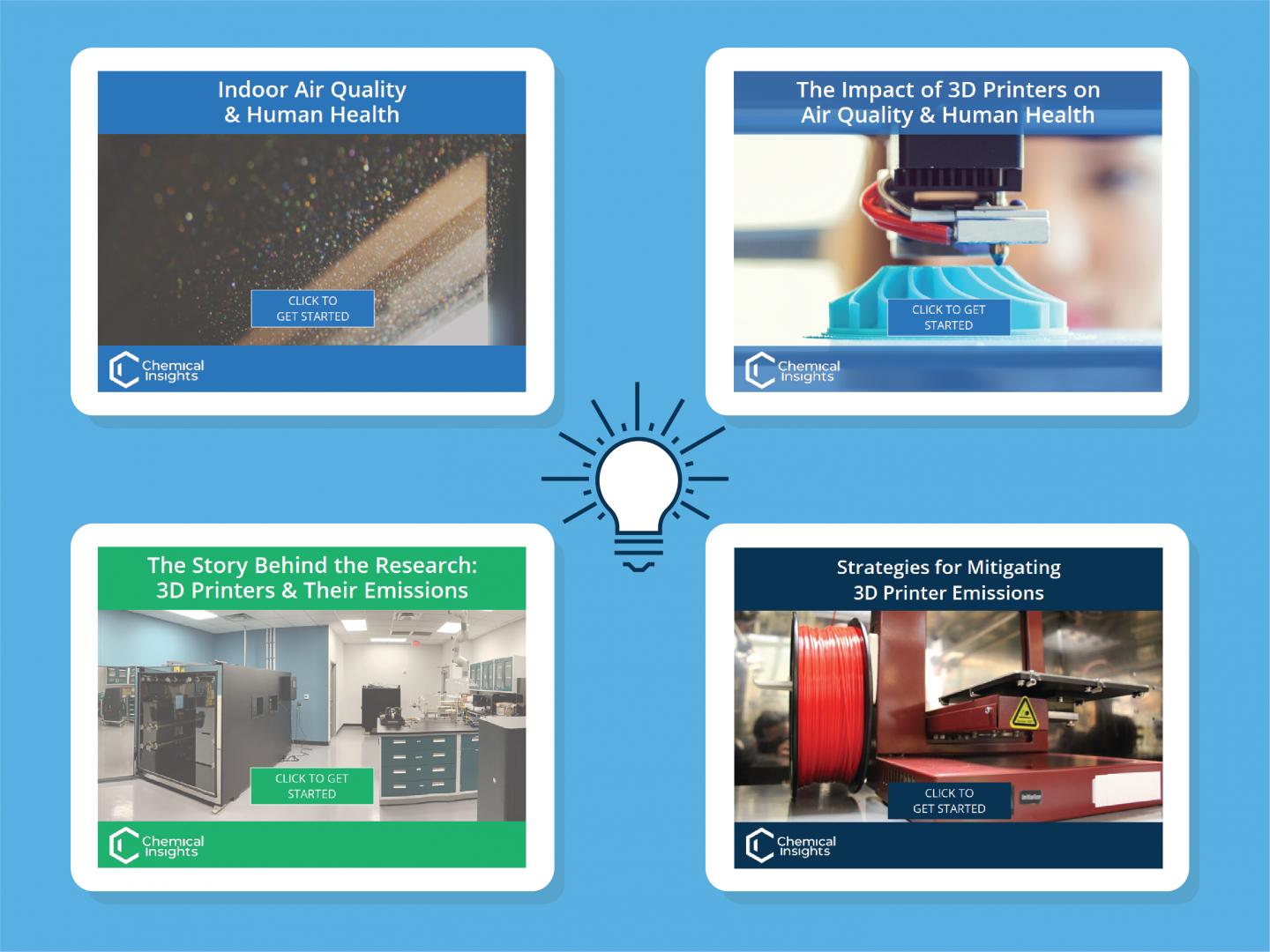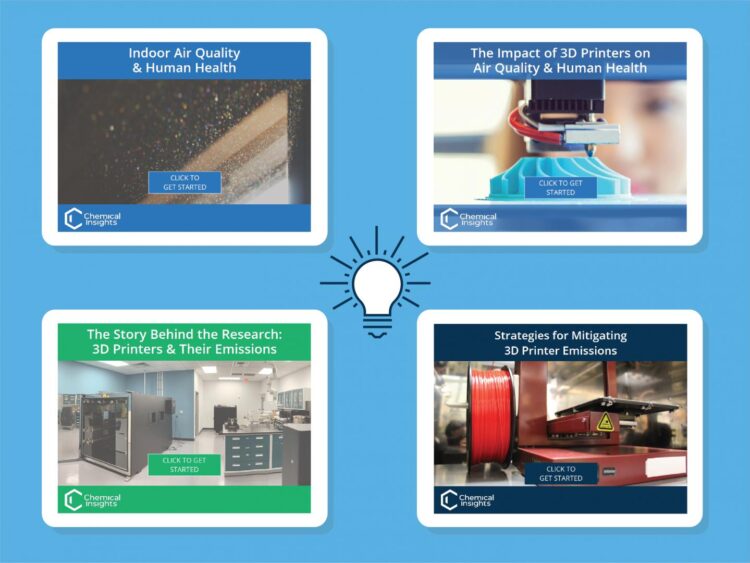Chemical Insights offers 3D printer safety and indoor air quality training to EPA’s Asthma Community Network

Credit: Cantilever Instruction & Design
Chemical Insights, an Institute of Underwriters Laboratories, has partnered with the U.S. Environmental Protection Agency (EPA) Indoor Environments Division to create awareness for people suffering from chronic lung diseases – like asthma – of the potential health risks associated with 3D printer emissions and steps they can take to reduce risk.
Based on research jointly conducted by Chemical Insights and researchers at Georgia Institute of Technology (Georgia Tech), Chemical Insights has launched a free, four-part online educational course available on the Asthma Community Network.
The virtual course starts with an introduction to indoor air quality and chemical emission terms, walks through the research findings, and ends with best practices for reducing 3D printing risks. The four modules of the virtual course are:
- 1. Indoor Air Quality and Human Health;
2. The Impact of 3D Printers on Air Quality and Human Health;
3. The Story Behind the Research: 3D Printers & Their Emissions; and
4. Strategies for Mitigating 3D Printer Emissions.
“The more informed a person is on the risks associated with poor indoor air quality and the chemical emissions derived from objects they may encounter at home, school or work, the more conscious they can become about mitigating the risks and avoiding adverse health issues. For asthma sufferers, this is essential,” said Dr. Marilyn Black, vice president and senior technical advisor for Chemical Insights. “We are proud to partner with the EPA on this educational initiative to inform people with asthma and help communities move forward to deliver better asthma care and create safer technology operating environments.”
“The quality of our indoor air is a major public health priority, with asthma alone affecting over 24 million Americans nationwide,” said Dave Rowson, Director of EPA’s Indoor Environments Division. “EPA is proud to work with Underwriters Laboratories to stay on the forefront of protecting public health. In particular, we appreciate the work Underwriters Laboratories is doing to understand and educate the public on how to best reduce potential risks from technological advances like 3D printing, which can affect the quality of air in our homes, schools, and workplaces.”
Chemical Insights is committed to researching chemicals and pollutants people interact with daily and educating the public to reduce exposure and protect human health. While 3D printers, in particular, continue to gain popularity both in the industrial and consumer sectors, the research conducted by Chemical Insights and Georgia Tech reveals that 3D printers release trace amounts of more than 200 different volatile organic compounds (VOCs) during operation, many of which are known or suspected irritants and carcinogens. Additionally, many desktop 3D printers were found to generate high levels of ultrafine particles (UFPs) that, when inhaled, could lead to respiratory concerns. Wider awareness and adoption of the mitigation strategies covered in module 4 of the virtual course will help reduce risks associated with the compounds and pollutants emitted from 3D printing.
###
To learn more about the impacts of 3D printing on indoor air quality and human health, access the free four-part online course at Asthma Community Network – https:/
About Chemical Insights
As an Institute of Underwriters Laboratories, we deliver the scientific insight policymakers, healthcare providers, business leaders and consumers depend on to make informed environmental health decisions. Combining the best minds, rigorous scientific research and a commitment for thorough and accurate results, Chemical Insights is improving the health of people and the planet.
Our work lets people around the world know what chemicals are in the air we breathe, the water we drink, and the products we interact with every day. Our research and initiatives gives them the knowledge of exactly what those chemicals are, how they may affect human health, and how to manage their impact. Our leadership role is to provide science or knowledge to implement improved practices, alternative product design, and changes that enable safer products and healthier environments.
To learn more, please visit chemicalinsights.org/.
Follow updates from Chemical Insights here:
Twitter: https:/
Facebook: https:/
Instagram: https:/
LinkedIn: https:/
YouTube: https:/
About Underwriters Laboratories
Underwriters Laboratories is a nonprofit organization dedicated to advancing the UL public safety mission through the discovery and application of scientific knowledge. We conduct rigorous independent research and analyze safety data, convene experts worldwide to address risks, share knowledge through safety education and public outreach initiatives, and develop standards to guide safe commercialization of evolving technologies. We foster communities of safety, from grassroots initiatives for neighborhoods to summits of world leaders. Our organization employs collaborative and scientific approaches with partners and stakeholders to drive innovation and progress toward improving safety, security, and sustainability, ultimately enhancing societal well-being. To learn more, visit UL.org.
Media Contact
Gillan Ritchie
[email protected]
Original Source
https:/





